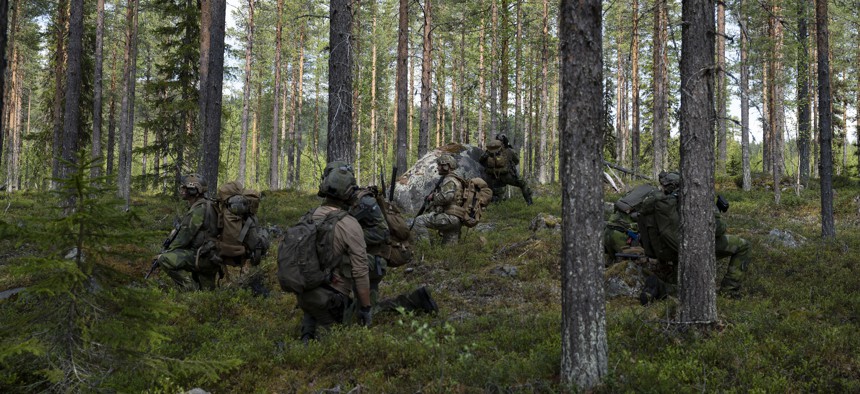
American reticence and Russian aggression have created a sense of urgency for the upcoming NATO Summit in The Hague, where leaders plan to redouble efforts toward digital transformation and multi-domain operations. That’s according to French Gen. Philippe Lavigne, a former chief of staff of the French Air and Space Force and a former NATO Supreme Allied Commander for transformation. Defense One sat down with Lavigne as part of a series of podcasts ahead of the 2025 Globsec Forum, taking place in Prague from June 12 to 14.
Here are a few highlights from that discussion.
The new NATO “is stronger than the old one.”
Lavigne said that’s due in part to the addition of Sweden in 2023 and Finland in 2024, which are contributing to a more coordinated strategy to defend the Baltic Sea. “It’s the way they are organizing themselves as they are building a very, very strong area in the north of this alliance.”
The summit will focus on digital tools and information sharing.
“You have all these lessons learned…in Ukraine. So of course, it’s integrated missile defense. It’s a big priority, but it’s also the ability to defend on the land, in the air and the sea, and also in cyber and space…That is about multi-domain operations enabled by digital transformation. And this digital transformation is so important because we need to sense, we need to understand and act better and faster than our adversary.”
Continuing experiments with AI and drones.
Lavigne highlighted the NATO Task Force X experiments currently underway in the Baltic Sea. Made possible by new members Sweden and Finland, the exercise uses AI, maritime drones, and shared data to protect undersea cables—a growing worry after Chinese vessels damaged communications infrastructure in the region last year.
“We’ve got several [other] experimentations, like Dynamic Messenger…about maritime operations. And what we try is to put as many unmanned systems above the sea, on the sea, under the sea, and build a common operating picture with AI.”
He described the 2023 experiment, in Portugal, as “successful.”
NATO will continue experimenting with unmanned systems for collecting maritime intelligence when Portugal hosts this year’s iteration of the annual exercise called REPMUS, for Robotic Experimentation and Prototyping with Maritime Unmanned Systems.
Allies increasingly agree on the need to develop better offensive capabilities.
The summit will see discussions of the need for better offensive strategies, Lavigne said. The lessons of Ukraine suggest that long-range strike capability is needed to protect European cities from missiles fired from deep within Russian territory, and offensive cyber operations are needed as well.
“We need to get tools to increase our deterrence. And so I’m speaking about deep strike capabilities. When we were talking about the precision strike, yes, it was also a shift in the [NATO] mentality. ‘Can we go further?’ And what I was saying is: ‘You can deter the archer from doing something, you can hit the arrow, but you can also hit the archer. So… that approach is validated by the nations and what you can do in the kinetic world, you can also do in the virtual world and the cyber.”
Europe needs more space capabilities.
“Europe is late” in developing independent space-based intelligence equipment, such as satellite imaging constellations, Lavigne said, noting that it is outspent by the United States and Chinese satellite industries. That won’t be solved solely through military procurement. Europe’s young space companies need government investment and a better civilian marketplace for services like communications, space-imagery for market conditions, etc. “We are going to build these [companies] as a part of the operationalization of space. I just have an example for you: Luxembourg is doing so well. They have put on the table…a multinational project. It’s called the Alliance Persistent Surveillance from Space. I mean, that’s what they are offering, but they are offering services for observation of the earth, for communication.”
It also needs plans to defend them.
“Everybody’s talking about counter-space operations because we need them,” he said. “There are some nations who are young adults…They are kids. So we need to ramp up in order to continue to have the freedom of access in space.”
NATO also needs to boost its space capabilities, through civilian, military, and business partnerships.
“We need these high, exquisite [military space] systems that are very, very complex. But we need also the mass—affordable mass. And the affordable mass is what the civilian sector can bring to us…And then the money. There is huge defense spending. The nations are increasing their defense spending, But it’s not enough. It’s not enough. It’s why private investment funds are needed…It’s why it’s super important, I think, to create an ecosystem where around the table, you’ve got armed forces, you’ve got big guys from defense tech, but also smaller guys, [research and development] university money and investment funds around the table.”
The post Move faster, share things: A former NATO transformation chief previews the summit appeared first on Defense One.




